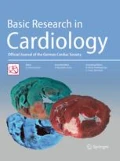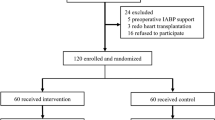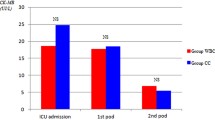Abstract
Remote ischemic preconditioning (RIPC) with transient upper limb ischemia reduces myocardial injury in patients undergoing on-pump coronary artery bypass grafting (CABG) with cross-clamp fibrillation or blood cardioplegia for myocardial protection. Whether or not such protection is still operative when standard crystalloid cardioplegic arrest is used is uncertain. Fifty-three consecutive, non-diabetic patients with triple-vessel disease and 64 ± 12 years of age (mean ± SD), who underwent elective CABG surgery with crystalloid (Bretschneider) cardioplegic arrest, were allocated in a prospective, randomized, single-blinded protocol to receive either a RIPC protocol (3 cycles of 5 min transient left upper arm ischemia induced by inflating a blood pressure cuff to 200 mmHg with 5 min of reperfusion) or control, respectively, after induction of anesthesia. Cardiac troponin I (cTnI) concentration was measured preoperatively and over 72 h postoperatively, and the area under the curve (AUC) was calculated. Peak postoperative cTnI concentration was significantly reduced from 13.7 ± 7.7 ng/mL in controls to 8.9 ± 4.4 ng/mL in RIPC (P = 0.008). Mean cTnI concentration was significantly lower at 6, 12, 24, and 48 h after surgery (ANOVA; P < 0.0001) in the RIPC patients (N = 27) than in controls (N = 26), resulting in a 44.5% reduction of cTnI (AUC at 72 h). RIPC by repetitive inflation of a cuff around the left upper arm before surgery enhances myocardial protection in patients undergoing CABG surgery with antegrade cold crystalloid cardioplegia.



Similar content being viewed by others
References
Ali ZA, Callaghan CJ, Lim E, Ali AA, Nouraei SA, Akthar AM, Boyle JR, Varty K, Kharbanda RK, Dutka DP, Gaunt ME (2007) Remote ischemic preconditioning reduces myocardial and renal injury after elective abdominal aortic aneurysm repair: a randomized controlled trial. Circulation 116(11 Suppl):I98–I105
Bøtker HE, Kharbanda R, Schmidt MR, Bøttcher M, Kaltoft AK, Terkelsen CJ, Munk K, Andersen NH, Hansen TM, Trautner S, Lassen JF, Christiansen EH, Krusell LR, Kristensen SD, Thuesen L, Nielsen SS, Rehling M, Sørensen HT, Redington AN, Nielsen TT (2010) Remote ischaemic conditioning before hospital admission, as a complement to angioplasty, and effect on myocardial salvage in patients with acute myocardial infarction: a randomised trial. Lancet 375:727–734
Braun SL, Barankay A, Mazzitelli D (2000) Plasma troponin T and troponin I after minimally invasive coronary bypass surgery. Clin Chem 46:279–281
Califf RM, Abdelmeguid AE, Kuntz RE, Popma JJ, Davidson CJ, Cohen EA, Kleiman NS, Mahaffey KW, Topol EJ, Pepine CJ, Lipicky RJ, Granger CB, Harrington RA, Tardiff BE, Crenshaw BS, Bauman RP, Zuckerman BD, Chaitman BR, Bittl JA, Ohman EM (1998) Myonecrosis after revascularization procedures. J Am Coll Cardiol 31:241–251
Caputo M, Dihmis W, Birdi I, Reeves B, Suleiman MS, Angelini GD, Bryan AJ (1997) Cardiac troponin T and troponin I release during coronary artery surgery using cold crystalloid and cold blood cardioplegia. Eur J Cardiothorac Surg 12:254–260
Cheung MM, Kharbanda RK, Konstantinov IE, Shimizu M, Frndova H, Li J, Holtby HM, Cox PN, Smallhorn JF, Van Arsdell GS, Redington AN (2006) Randomized controlled trial of the effects of remote ischemic preconditioning on children undergoing cardiac surgery: first clinical application in humans. J Am Coll Cardiol 47:2277–2282
Chocron S, Alwan K, Toubin G, Clement F, Kaili D, Taberlet C, Cordier A, Etievent JP (1996) Crystalloid cardioplegia route of delivery and cardiac troponin I release. Ann Thorac Surg 62:481–485
Croal BL, Hillis GS, Gibson PH, Fazal MT, El-Shafei H, Gibson G, Jeffrey RR, Buchan KG, West D, Cuthbertson BH (2006) Relationship between postoperative cardiac troponin I levels and outcome of cardiac surgery. Circulation 114:1468–1475
Fellahi JL, Gue X, Richomme X, Monier E, Guillou L, Riou B (2003) Short- and long-term prognostic value of postoperative cardiac troponin I concentration in patients undergoing coronary artery bypass grafting. Anesthesiology 99:270–274
Ferdinandy P, Schulz R, Baxter GF (2007) Interaction of cardiovascular risk factors with myocardial ischemia/reperfusion injury, preconditioning, and postconditioning. Pharmacol Rev 59:418–458
Force T, Hibberd P, Weeks G, Kemper AJ, Bloomfeld P, Tow D, Josa M, Khuri S, Parisi AF (1990) Perioperative myocardial infarction after coronary artery bypass surgery: clinical significance and approach to risk stratification. Circulation 82:903–912
Franke U, Wahlers T, Cohnert TU, Koenig J, Rath NF, Wirsing M, Haverich A (2001) Retrograde versus antegrade crystalloid cardioplegia in coronary surgery: value of troponin-I measurement. Ann Thorac Surg 71:249–253
Glineur D, Hanet C, Poncelet A, D’hoore W, Funken JC, Rubay J, Kefer J, Astarci P, Lacroix V, Verhelst R, Etienne PY, Noirhomme P, El Khoury G (2008) Comparison of bilateral internal thoracic artery revascularization using in situ or Y graft configurations: a prospective randomized clinical, functional, and angiographic midterm evaluation. Circulation 118:S216–S221
Hausenloy DJ, Mwamure PK, Venugopal V, Harris J, Barnard M, Grundy E, Ashley E, Vichare S, Di Salvo C, Kolvekar S, Hayward M, Keogh B, MacAllister RJ, Yellon DM (2007) Effect of remote ischaemic preconditioning on myocardial injury in patients undergoing coronary artery bypass graft surgery: a randomised controlled trial. Lancet 370:575–579
Hausenloy DJ, Yellon DM (2008) Clinical translation of cardioprotective strategies: report and recommendations of the Hatter Institute 5th International Workshop on Cardioprotection. Basic Res Cardiol 103:493–500
Hausenloy DJ, Ong SB, Yellon DM (2009) The mitochondrial permeability transition pore as a target for preconditioning and postconditioning. Basic Res Cardiol 104:189–202
Heusch G (2001) Nitroglycerin and delayed preconditioning in humans: yet another new mechanism for an old drug? Circulation 103:2876–2878
Heusch G, Schulz R (2002) Remote preconditioning. J Mol Cell Cardiol 34:1279–1281
Heusch G, Kleinbongard P, Böse D, Levkau B, Haude M, Schulz R, Erbel R (2009) Coronary microembolization: from bedside to bench and back to bedside. Circulation 120:1822–1836
Heusch G, Boengler K, Schulz R (2010) Inhibition of mitochondrial permeability transition pore opening: the holy grail of cardioprotection. Basic Res Cardiol 105:151–154
Heusch G, Boengler K, Schulz R (2008) Cardioprotection: nitric oxide, protein kinases, and mitochondria. Circulation 118:1915–1919
Hoole SP, Heck PM, Sharples L, Khan SN, Duehmke R, Densem CG, Clarke SC, Shapiro LM, Schofield PM, O’Sullivan M, Dutka DP (2009) Cardiac Remote Ischemic Preconditioning in Coronary Stenting (CRISP Stent) Study: a prospective, randomized control trial. Circulation 119:820–827
Jacob S, Kallikourdis A, Sellke F, Dunning J (2008) Is blood cardioplegia superior to crystalloid cardioplegia? Interact Cardiovasc Thorac Surg 7:491–498
Jenkins DP, Pugsley WB, Alkhulaifi AM, Kemp M, Hooper J, Yellon DM (1997) Ischaemic preconditioning reduces troponin T release in patients undergoing coronary artery bypass surgery. Heart 77:314–318
Koh TW, Carr-White GS, DeSouza AC, Ferdinand FD, Hooper J, Kemp M, Gibson DG, Pepper JR (1999) Intraoperative cardiac troponin T release and lactate metabolism during coronary artery surgery: comparison of beating heart with conventional coronary artery surgery with cardiopulmonary bypass. Heart 81:495–500
Krejca M, Skiba J, Szmagala P, Gburek T, Bochenek A (1999) Cardiac troponin T release during coronary surgery using intermittent cross-clamp with fibrillation, on-pump and off-pump beating heart. Eur J Cardiothorac Surg 16:337–341
Lehrke S, Steen H, Sievers HH, Peters H, Opitz A, Müller-Bardorff M, Wiegand UK, Katus HA, Giannitsis E (2004) Cardiac troponin T for prediction of short- and long-term morbidity and mortality after elective open heart surgery. Clin Chem 50:1560–1567
Lim SY, Yellon DM, Hausenloy DJ (2010) The neural and humoral pathways in remote limb ischemic preconditioning. Basic Res Cardiol. doi:10.1007/s00395-010-0099-y
Mohammed AA, Agnihotri AK, van Kimmenade RR, Martinez-Rumayor A, Green SM, Quiroz R, Januzzi JL Jr (2009) Prospective, comprehensive assessment of cardiac troponin T testing after coronary artery bypass graft surgery. Circulation 120:843–850
Osswald BR, Blackstone EH, Tochtermann U, Schweiger P, Thomas G, Vahl CF, Hagl S (2001) Does the completeness of revascularization affect early survival after coronary artery bypass grafting in elderly patients? Eur J Cardiothorac Surg 20:120–125
Ovize M, Baxter GF, Di Lisa F, Ferdinandy P, Garcia-Dorado D, Hausenloy DJ, Heusch G, Vinten-Johansen J, Yellon DM, Schulz R (2010) Postconditioning and protection from reperfusion injury: where do we stand? Cardiovasc Res. doi:10.1093/cvr/cvq129
Pichon H, Chocron S, Alwan K, Toubin G, Kaili D, Falcoz P, Latini L, Clement F, Viel JF, Etievent JP (1997) Crystalloid versus cold blood cardioplegia and cardiac troponin I release. Circulation 96:316–320
Przyklenk K, Bauer B, Ovize M, Kloner RA, Whittaker P (1993) Regional ischemic ‘preconditioning’ protects remote virgin myocardium from subsequent sustained coronary occlusion. Circulation 87:893–899
Thielmann M, Massoudy P, Schmermund A, Neuhäuser M, Marggraf G, Kamler M, Herold U, Aleksic I, Mann K, Haude M, Heusch G, Erbel R, Jakob H (2005) Diagnostic discrimination between graft-related and non-graft-related perioperative myocardial infarction with cardiac troponin I after coronary artery bypass surgery. Eur Heart J 26:2440–2447
Thygesen K, Alpert JS, White HD; Joint ESC/ACCF/AHA/WHF Task Force for the Redefinition of Myocardial Infarction, Jaffe AS, Apple FS, Galvani M, Katus HA, Newby LK, Ravkilde J, Chaitman B, Clemmensen PM, Dellborg M, Hod H, Porela P, Underwood R, Bax JJ, Beller GA, Bonow R, Van der Wall EE, Bassand JP, Wijns W, Ferguson TB, Steg PG, Uretsky BF, Williams DO, Armstrong PW, Antman EM, Fox KA, Hamm CW, Ohman EM, Simoons ML, Poole-Wilson PA, Gurfinkel EP, Lopez-Sendon JL, Pais P, Mendis S, Zhu JR, Wallentin LC, Fernández-Avilés F, Fox KM, Parkhomenko AN, Priori SG, Tendera M, Voipio-Pulkki LM, Vahanian A, Camm AJ, De Caterina R, Dean V, Dickstein K, Filippatos G, Funck-Brentano C, Hellemans I, Kristensen SD, McGregor K, Sechtem U, Silber S, Tendera M, Widimsky P, Zamorano JL, Morais J, Brener S, Harrington R, Morrow D, Lim M, Martinez-Rios MA, Steinhubl S, Levine GN, Gibler WB, Goff D, Tubaro M, Dudek D, Al-Attar N (2007) Universal definition of myocardial infarction. Circulation 116:2634–2653
Venugopal V, Hausenloy DJ, Ludman A, Di Salvo C, Kolvekar S, Yap J, Lawrence D, Bognolo J, Yellon DM (2009) Remote ischaemic preconditioning reduces myocardial injury in patients undergoing cardiac surgery with cold-blood cardioplegia: a randomised controlled trial. Heart 95:1567–1571
Author information
Authors and Affiliations
Corresponding author
Additional information
D. M. Yellon, London, UK served as guest editor for the manuscript and was responsible for all editorial decisions, including the selection of reviewers. The policy applies to all manuscripts with authors from the editor's institution.
Rights and permissions
About this article
Cite this article
Thielmann, M., Kottenberg, E., Boengler, K. et al. Remote ischemic preconditioning reduces myocardial injury after coronary artery bypass surgery with crystalloid cardioplegic arrest. Basic Res Cardiol 105, 657–664 (2010). https://doi.org/10.1007/s00395-010-0104-5
Received:
Revised:
Accepted:
Published:
Issue Date:
DOI: https://doi.org/10.1007/s00395-010-0104-5




